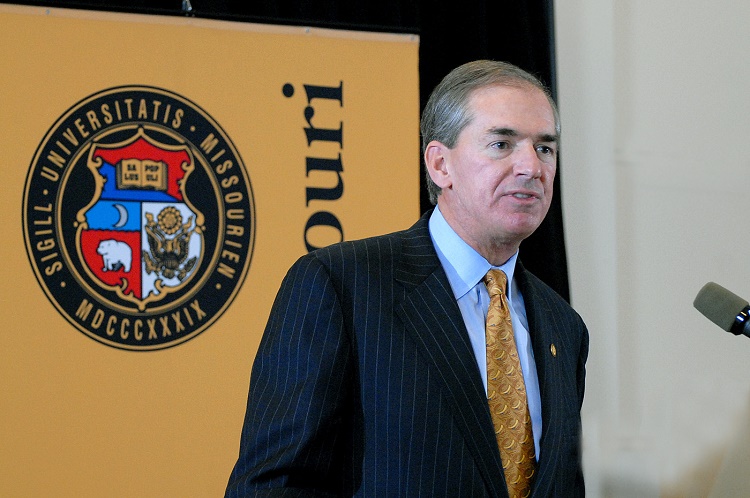Gift supports a collaborative effort between UMKC and MU housed in Kansas City.
Former UM System president Gary Forsee and Sherry Forsee have committed $2 million to support research that will provide data analytics to power the NextGen Precision Health initiative and other precision health research across the University of Missouri System’s four universities.
The gift will support the NextGen Data Science and Analytics Innovation Center, or dSAIC, which is based at the University of Missouri-Kansas City and operates in partnership with the University of Missouri-Columbia. UMKC will receive $1.2 million and MU will receive $800,000.
One role of the center will be to harness immense datasets to extract insights, patterns and knowledge, illuminating the work done at the NextGen Precision Health building, across the system’s institutions and health enterprises. The Precision Health building, currently under construction on the MU campus, aims to usher in a new era of personalized health care by developing medical breakthroughs to treat diseases based on individual variability in genes, environment and lifestyle rather than a one-size-fits-all approach.
The Forsees considered the project a great fit for their philanthropic interests, specifically in support of higher education in Missouri. Gary Forsee, a Kansas City resident and former UM System president, is a 1972 graduate of Missouri University of Science and Technology. He serves as a member of the UMKC Board of Trustees and an emeritus director of the UMKC Foundation as well as a member of the NextGen Advisory Board. With a background in the technology industry, he has a clear understanding of the key components necessary to provide the infrastructure for data research and engagement that benefit Kansas City and beyond.
“The ability to analyze vast amounts of data and apply that knowledge to some of today’s most critical health problems will have untold short-term and long-term impacts.”
“Through the development of NextGen Precision Health initiative and the UMKC NextGen Data Science and Analytics Innovation Center, we are helping to lay the groundwork for revolutionary changes in health care,” Forsee said. “The ability to analyze vast amounts of data and apply that knowledge to some of today’s most critical health problems will have untold short-term and long-term impacts.”
dSAIC creates a leading-edge data analytics center that can support university research across the state and play a critical role in health, business and workforce development across Kansas City and the region. The Forsees’ gift is the first step in making that happen.
“Looking back five years from now, we’ll judge the success of the center based on the outcomes,” Forsee said. “What systems have been put in place and what are the real project benefits of this center? I want to ensure that with the benefit of artificial intelligence, cloud computing, big data and data analytics that we’ve made significant progress in the NextGen Precision Health initiative.”
At MU, a portion of the gift will be used to build necessary computing infrastructure that supports pilot projects and collaborations between life science and health care experts, and engineering faculty. Focus areas include security for medical health care records; DNA sequencing and analysis for individual patients; and automated diagnosis of medical imagery for precision health.
The expansion of big data capabilities within the UM System will be complementary to the personalized medicine research at UMKC hospital affiliates and MU Health Care, among other possibilities.
“As president of the UM System, Gary helped refine the vision of our NextGen initiative,” said Mun Choi, president of University of Missouri System and chancellor of University of Missouri-Columbia. “Now, with his continued work on our advisory board and his support in both Kansas City and Columbia, we are turning that dream into a reality.”
“Vision is critical, whether it involves something as finite as physical space or something as boundless as data analysis,” Agrawal said. “Beyond the benefit of the financial support, the Forsees’ gift is an invaluable validation of the importance of this initiative and its potential impact on the people of Missouri.” – Chancellor Mauli Agrawal
UMKC Chancellor Mauli Agrawal has reinforced the university’s strategy related to growing data science and research. Between the new Robert W. Plaster Free Enterprise Center, critical private-public research projects and a clear focus on building the research capabilities of the university through dSAIC, UMKC is positioned to capitalize on significant investments.
“Vision is critical, whether it involves something as finite as physical space or something as boundless as data analysis,” Agrawal said. “Beyond the benefit of the financial support, the Forsees’ gift is an invaluable validation of the importance of this initiative and its potential impact on the people of Missouri.”
Jannette Berkley-Patton, leader of the UMKC Health Equity Institute and a School of Medicine professor, is currently studying the potential health benefits of reliable and free public transportation in urban areas. Her work entails comparing data from more than 10,000 people.
“Data isn’t just numbers on a spreadsheet or a chart,” Berkley-Patton said. “With our initiatives, we are using data to affect people’s lives. The Forsees’ gift enables us to continue that work and improve the lives of Missourians.”
Prasad Calyam, lead MU scientist on the project, associate professor of electrical engineering and computer science, and director of the Cyber Education, Research and Infrastructure Center (Mizzou CERI) in the MU College of Engineering, said the funds will advance interdisciplinary collaborations in precision health.
“It will enable development of cloud computing expertise and knowledge bases in seamless integration of open/protected data sets as well as medical imagery analytics with intelligent automation using advances in machine learning and artificial intelligence,” Calyam said. “Resulting cyber and human resources will further strengthen partnerships with industry to develop secure and community-scale big data analytics environments that foster research and education innovations in precision health.”

